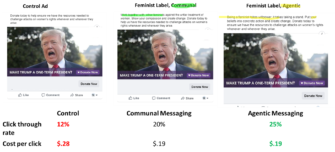How Do You Find Out Why People Give?
For starters, don’t ask.
Asking donors “why” tends to produce rationale or superficial answers. A slightly better approach is asking why a particular cause (not the charity itself) is important to them. This will likely result in describing experiences, which may indirectly shed light on the ‘why’. The danger here is relying on a researcher to intuit this. It can be done with multiple researchers doing independent coding and statistically comparing those answers, but that process is rare – i.e., doesn’t happen in practice.
The better way is standing on the backs of anonymous giants and doing a lit review – e.g., a Google Scholar search or AI Bing. This is how you start your testing process with theory versus semi-random test ideas and semi-random results with no real insight. The Test loses. The Test wins. Next Test please.
Without knowing why the test lost/beat the control, the result doesn’t matter.
We were thinking about feminism and why people support women’s rights groups. There’s been reams of academic thought on this topic.
[Heck, academics study damn near everything. As proof, a study one in the Ergonomics journal titled, “Impact of wet underwear on thermoregulatory responses and thermal comfort in the cold”. As it turns out, wet underwear sucks.]
Our aims wasn’t just unearthing theories about what makes feminists tick but what makes some tick differently from others. No group, no matter how homogenous on the surface, is monolithic.
Here’s a snippet of what we found. And what we found is just the tip of the iceberg.
- Three people can have the exact same beliefs with one person adopting the “feminist” label in public (e.g. Facebook), the 2nd only being comfortable doing so in private and the 3rd, not at all. Labels matter but not equally nor in the same direction.
- Some feminists are motivated by communal messaging (e.g., work with other feminists) while others by agentic (e.g., take a stand for your beliefs)
We ran a Communal and Agentic messaging ad against the control. Both beat the control. We know why. We also have further in-market evidence that not all feminists are the same. And our test results sit on a foundation of other research and evidence. We should feel much more confident in these results because of it.

Next, we then ran versioning of our winning ads to explore the feminist label question. We found that overall, the best ad is No Feminist Label and Agentic messaging.

But why in the world would we look for a ‘winner’ instead of winners? The idea of a single control is 100% counter to being “donor-centric”.
The real upside here is not refining a campaign. It’s tagging the Agentic Feminist label ad responders as such in your CRM. Once that’s done the subsequent touchpoints with the donor can be tailored accordingly.
The aim becomes further testing and refining and optimizing for up to four different groups of feminists who may equally support your cause but are different in how best to motivate and activate their sense of self.
This isn’t more time or money compared to a current state of one-size-fits-nobody and semi-random testing, which takes up plenty of time and money. It’s reapplying the same time and money differently.
To do so requires a mindset shift that refuses to think and believe in a single control or one-size-fits-nobody journey.
In short, we need to show our supporters we care as much as they do by showing we know their ‘why’. Only then can we reverse any of the oft-cited flat to negative trend lines plaguing the sector.
Kevin



Kevin, an excellent article illustrating, one should be careful at accepting research at face value.When I taught in my Masters Degree, I would have assigned a piece of research. You are right we do not lack for -Research- we lack quality and defensible research. I have given money for Applied Research and frankly disappointed in the resuilt. What value is the research, if we can not rely on it viablity in the real world. Instead our profession continues to rely on folk lore and stories. Not sure that qualifies as a Profession. Thanks.
Thanks Bob as always for reading, commenting and the time and resources you’ve committed to help professionalize the sector. I’m curious what you think the shortcomings were of the Applied Research you funded? Was it weak strategy/thinking up front or poor design and execution or both?
Kevin